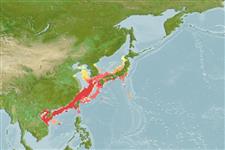Asteroidea |
Paxillosida |
Astropectinidae
Environment: milieu / climate zone / تغييرات عمق / distribution range
بوم شناسي
; تغييرات عمق 77 - 134 m (مرجع 81020). Tropical
Northwest Pacific: China and Taiwan.
Length at first maturity / Size / Weight / سن
بلوغ: Lm ? range ? - ? cm
Life cycle and mating behavior
بلوغ | تولید مثل | تخم ریزی | Eggs | Fecundity | Larvae
Members of the class Asteroidea exhibit both asexual (regeneration and clonal) and sexual (gonochoric) means of reproduction. Life cycle: Embryos hatch into planktonic larvae and later metamorphose into pentamorous juveniles which develop into young sea stars with stubby arms.
مآخذ اصلی
مراجع | هماهنگ كننده | همكاران
Chao, S.-M. 1999 A revision of the family Astropectinidae (Echinodermata: Asteroidea) from Taiwan, with description of five new records. Zoological Studies 38(3):257-267. (مرجع 85006)
وضعيت در فهرست قرمز IUCN
(مرجع 130435: Version 2025-1)
وضعيت از نظر سايتس (مرجع 108899)
Not Evaluated
Not Evaluated
خطر برای انسان ها
Harmless
استفاده انسانی
| FishSource |
ابزارها
اطلاعات بيشتر
Trophic EcologyFood items (preys)
تركيب غذايي
مصرف غذايي
شکارچیان
Population dynamicsرشد
Max. ages / sizes
Length-weight rel.
Length-length rel.
نوسانات طولی
Mass conversion
فراواني
Life cycleتولید مثلبلوغFecundityتخم ریزیEggsنمو تخمLarvae PhysiologyOxygen consumption
Human RelatedStamps, coins, misc.
منابع اينترنتي
Estimates based on models
Preferred temperature
(Ref.
115969): 15.3 - 23.6, mean 18.8 (based on 63 cells).
